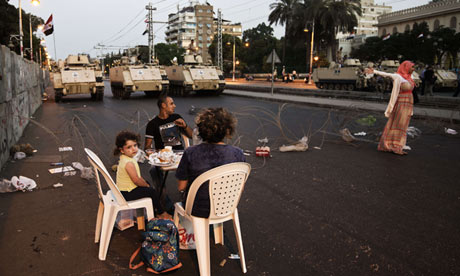دور الجيش في إسقاط محمد مرسي يثير المخاوف في أوساط المحتجين - الغارديان البريطانية- 14 تموز 2013
Army's role in fall of Mohamed Morsi stirs fears among Egyptian protesters
The part of the armed forces and police in toppling the former president has gained praise but activists warn against 'military fascism'

Egyptian army APCs are stationed outside the presidential palace in Cairo as opponents of ousted president Mohamed Morsi break their fast on Friday. Photograph: Gianluigi Guercia AFP/Getty Images
On Friday night, the five-mile drive between Tahrir Square in central Cairo and the Rabaa al-Adawiya mosque to the east was a journey between two parallel universes. At Rabaa, the ground zero of pro-Morsi support for the last fortnight, protesters chanted against General Abdel Fatah al-Sisi, the man who forced Mohamed Morsi from office.
But in Tahrir Square, where hundreds of thousands gathered on 30 June to call for Sisi's intervention, and where thousands more gathered to break their Ramadan fast on Friday, few would say a word against him. Many even wore his photograph around their necks.
"This was not a military coup," said Maluq el-Batrawy, a veiled 56-year-old, sitting in a wheelchair, and holding a picture of the general. "Sisi was following the people's will."
For many of the revolutionaries who rose to prominence during the fall of Hosni Mubarak, the ousting of Morsi – seen as being just as autocratic as his predecessor – was another necessary step towards achieving the goals of the 2011 revolution. Yet they do not welcome the army's role either, since the military represents simply another incarnation of the same authoritarianism.
"I don't think there's anything to celebrate," said Mariam Kirollos, a Morsi critic, and a human rights activist who was heavily involved in the 2011 uprising. "Shifting from religious fascism to military fascism is not something worth celebrating. Unless they prove me wrong and make some reforms."
For Wael Eskandar, an activist and journalist, Morsi's downfall still represents the best way of achieving the goals of the 25 January revolution. Eskandar said that army rule was not the answer – but that it still offers a more likely route to eventual reform than Morsi. "With Morsi, there was no chance," he said. "Morsi was an autocrat and he got us no way closer to democracy. At least with this change, there is more chance of building a democratic framework."
Yet the army's massacre last Monday of at least 51 Morsi supporters – and the indifferent, even jubilant reaction from some Morsi opponents – was a stark reminder that the military are no custodians of revolutionary values.
"Our revolution started [in 2011] from a very humane point of view – we protested against police brutality," said Kirollos. "Our demands were very clear: bread, freedom and social justice. But now I'm devastated by the level of inhumanity the majority has descended to."
Some, like Eskandar, also fear that the downfall of Morsi – whom prosecutors said they were investigating on charges of espionage, inciting violence and ruining the economy – will help rehabilitate the same Mubarak loyalists and institutions that the 2011 revolution was supposed to sideline. The police force is one. Its brutality was a major cause of the 2011 revolution, while the reform of the force was one of its implicit demands. But the police's enthusiasm for Morsi's fall has helped rehabilitate them in some eyes.
Uniformed officers were seen holding anti-Morsi propaganda in the runup to his departure, while police pointedly failed to protect the offices of Morsi's Muslim Brotherhood. Many even marched against Morsi, and at some rallies protesters chanted: "The police and the people are one hand."
Many have been heartened by the army's decision to take a lesser role than it did during its last brutal stint in power in the 15 months after Mubarak's fall. Last week it immediately handed over power to a caretaker civilian president, who then set a timetable for new elections.
But there are still concerns at how the new army-backed regime seems to be diminishing the role of activists from the Tamarod campaign, the grassroots movement that brought millions into the streets last week.
A Tamarod spokesman said last week that the group was not consulted on Egypt's temporary new constitution. Even the National Salvation Front (NSF), the largest formal anti-Morsi coalition, sometimes criticised for its links to Mubarak-era politicians, voiced concerns. "The new government must be made up from figures who belong to the 25 January revolution, and who are known for their credible stands in support of the revolution since it took place," said Khaled Dawoud, an NSF spokesman.
For the Big Pharaoh, the alias of an Egyptian blogger who rose to prominence internationally during the 2011 revolution, it is a case of wait-and-see. "I am a little bit concerned about the size of the Mubarak regime within the new order," he said. "But until now I do not see signs that the Mubarak guys are jumping in. And there are good signs. Hazem Beblawi [the new prime minister] was not part of the old regime, and neither was his deputy."
But for most revolutionaries, success does not just depend on who is in charge. As Kirollos points out, throughout the days of both Mubarak and Morsi, and during the military junta that split their regimes, one revolutionary chant has been a constant at protests: "The people demand the fall of the regime."
For Egypt's revolutionaries, the leaders at the top may rise and fall, but the oppressive state apparatus below them has remained intact. Until that regime falls, rather than just its figureheads, the revolution will continue.


تعليقات